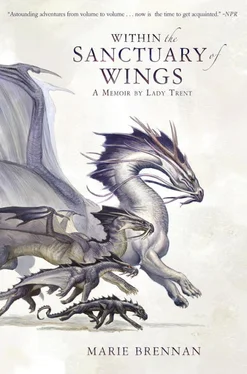Before we separated, though, I whispered quietly in his ear. “Gather your wits as fast as you can. Suhail and Thu are here, but their safety depends on our keeping the peace.”
He stared at me as I drew back, but I dared not say any more. Colonel Dorson was waiting with thinly concealed impatience as I climbed out of the gondola once more, leaving Tom to pull himself together. “I imagine you have a hell of a story to tell, Lady Trent.”
“I do indeed, Colonel. But before I do, I must ask: what are your intentions here?”
Clearly this was not the direction Dorson had expected our conversation to take. “That is a military matter, Lady Trent. I am very glad to see you alive, but I must remind you that your status as a scientist, or even as a peer of the realm, does not give you the authority to inquire after such things.”
My mouth was very dry. “Ah, but I am not asking as a peer of Scirland, nor even as a scientist. I am asking as the appointed emissary of—of a foreign nation.”
Andrew’s arm dropped from my shoulder. He and Dorson were not the only ones staring at me; by now the caeliger was fully secured, and the men from it were watching this exchange with interest. To my surprise, a number of them were Yelangese. Khiam Siu? They must be; only our rebel allies would be here, walking free in the midst of a military expedition.
Their presence only furthered my suspicions. “Let me guess: you are looking for an aerial route by which to invade Yelang. No—something more than that. Our caeligers cannot traverse these mountains so easily that overleaping the whole mass in one step would be feasible, not by anything other than the most lightly manned craft.” The Sanctuary stretched out before us, the peak of Anshakkar shining in its center. My mouth kept working, taking input but no caution from my brain. “You want to use this as a base. It lies beyond Tser-zhag authority, and is unknown to the outside world; if you could establish yourselves here, then you could mount patrols or military excursions at will. It would allow you to control this entire region.”
“Well, yes,” Andrew said, as if he saw no point in denial.
“Captain Hendemore.” This time Andrew did salute, but Dorson was no longer paying attention to him. “I see the keenness of your intellect is not exaggerated, Lady Trent. But what in God’s name do you mean, calling yourself the emissary of a foreign nation? Are you talking about whatever yak-herders live here? I hardly think they can call themselves a nation, and I fail to see why they would need to appoint anybody to speak on their behalf. Or are you working for the Tser-zhag king?”
I wondered how much he knew about my actions in Bayembe, when I had, not entirely on purpose, undermined our colony there. At the time it had been a great scandal (I was even accused of treason), but I had won enough acclaim in subsequent years that not everyone remembered that incident. I said, “This has nothing to do with Tser-nga, except insofar as they have a neighbour they are not aware of. My purpose here today is to prevent a conflict which would be detrimental in the extreme to both this land and our own. I have done more than survive, Colonel; I have made a discovery of such magnitude as to cast all my previous work into insignificance by comparison. Scirland has the opportunity to share that discovery with the world—to establish our pre-eminence in ways other than military, which can only be to our benefit.”
My declaration aroused a great deal of curiosity, which was as I had hoped. Dorson, however, remained skeptical. “Do you mean that carcass Sir Thomas claimed to have found in the mountains? If it is as he described, then I suppose it is of interest to scientific types—a new sort of dragon, one we didn’t think really existed. But I fail to see what relevance that has for our situation here.”
A glance over my shoulder revealed that Tom was on his feet, though holding on to the edge of the gondola as if it might be necessary to his continued verticality. I should have liked for him to be more steady, but I did not think I could delay any further.
I made myself smile, as if I had no fear in the world, only excitement for the news I bore. “It is far more than that, Colonel. May I have your word that your men will hold their fire?” Each of them bore a rifle, and while they had not unslung them and readied them for use, I was certain they could do so with great speed.
Dorson tensed at my words. “Lady Trent, asking a military man to hold his fire only confirms for him that there may be a reason to shoot.”
“The people of the Sanctuary have no weapons to match yours,” I assured him. “I only wish to forestall any misunderstanding that might result in needless bloodshed. If you please?”
A tense silence ensued. I dared not look away from Dorson, though I knew Andrew was staring at me, and I was desperately curious whether Tom had guessed my meaning. Finally Dorson said, “Very well, Lady Trent. Men, hold your fire—for now.”
It was the best I could hope for. Now I spared another glance at Tom, and my grin, though still nervous, was also sincere. “This,” I promised my colleague, “is also not a delusion.”
Then I addressed them all, in ringing tones. “What we found in the col was more than merely another kind of dragon. It was the sad remains of one of the people of this valley.” Turning, I called out in Draconean, “Ruzt, please stand up.”
More introductions—Tom’s imagination—Engine malfunction—A good omen for the Khiam Siu—Distractions—Giat Jip-hau and the elders
Ruzt had volunteered herself for this duty because she was more comfortable around humans than any other Draconean save possibly Kahhe, and I had accepted her offer because I trusted her more than any other Draconean, Kahhe included. But we both knew that if anything went wrong in that first moment, she would be the one who took the brunt of it, and I could not breathe as she stood up.
Dorson’s men did not fire. Andrew swore as imaginatively as any sailor, and the colonel did not reprimand him. Ruzt, to my undying astonishment, made her very best mimicry of the curtsey I had given to the elders when I departed from their council, which I had explained to her was a gesture of politeness. I do not think anyone else realized what her movement was supposed to be.
I said, “This Draconean and her sisters saved my life after the avalanche. It is on their behalf, and that of all the Draconeans in the Sanctuary of Wings, that I signaled for you to land here today. If you are willing, Colonel Dorson, I will take you, Sir Thomas, and a small number of your men to meet with representatives from their council of elders.”
Enough time had passed without violence that I felt safe in tearing my eyes away from Ruzt and the soldiers and looking at Tom. Judging by his expression, it was entirely possible he had not taken a single breath since Ruzt stood up. I could not help smiling: despite the tension, it was a pure joy to share this discovery with the man who had been my friend and colleague for so many years. Once the last of the laudanum had left his body, we would have a tremendous amount to discuss.
Dorson was staring too, but with a good deal more shock than revelatory understanding. In a limp and wandering voice, he said, “How is this possible?”
At least my encounter with Suhail and Thu the previous day had given me some practice in explaining. I delivered the most concise version I could, blessing the fact that military discipline meant no one interrupted me with a single question. The biological origins of the Draconeans I glossed over with a brief reference to developmental lability; Tom would have guessed a fair bit of it on his own by now, and the phrase would mean nothing to Dorson, which meant I could elide anything that might require me to utter the ominous word “blood.” But I told him of the Downfall—a brief rendition of what I could piece together between the Draconean version of that tale and our own—and how, over the millennia, the survivors had taken refuge here. “And now, Colonel, you see why I call them a nation, for they are certainly not Tser-zhag.”
Читать дальше












